Air Force Vietnam War Lemont, IL Flight date: 07/20/22
By Charlie Souhrada, Honor Flight Chicago Veteran Interview Volunteer
A knack for language helped propel Richard “Rich” Renkas through more than four years of service in the U.S. Air Force and 354 combat missions. He was awarded the Distinguished Flying Cross. As a Vietnam veteran, he will be honored with a flight to Washington, D.C. on July 20, 2022 courtesy of Honor Flight Chicago.
Rich was born September 5, 1946. His father, Edward, worked in the stockyards, while his mother, Bernice, kept the home and later went to work as a cleaning lady in the Prudential Building downtown.
As an only child growing up in a Polish household in the Back of the Yards neighborhood, Rich didn’t learn to speak English until he was six years old. “My grandmother and mother were both from Poland and that’s all they spoke,” he says. “Kids used to laugh at me because I couldn’t speak to them. My ma said I learned how to speak English after that!”
Rich’s childhood was rather typical, filled with lots of activity and centered around two southside schools. During his early years he attended St. Basil’s Catholic School at West Garfield Boulevard and South Wood Street. Later he attended St. Ignatius College Prep on West Roosevelt Road, where he graduated in 1964.
After high school, Rich worked in the mailroom at Price Waterhouse and took basic classes at Loyola University. “I wasn’t geared too well for that. It lasted until 1967 when I went into the service.”
On December 5, 1967, he enlisted in the U.S. Air Force. Three days later, on December 8, his draft notice came in the mail. “I was already in!” he laughs. “I didn’t want to go into the Army and wanted to decide what I was going to do. You don’t get much choice when you’re drafted.”
He took Basic Military Training at Lackland Air Force Base in San Antonio, Texas. After Basic Training, Rich was sent to The Presidio of Monterey, in Monterey, California, an active U.S. Army installation to attend the Defense Language Institute Foreign Language Center (DLIFLC).
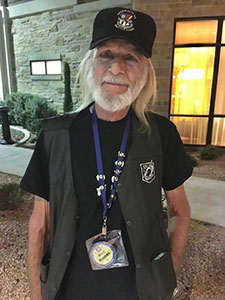
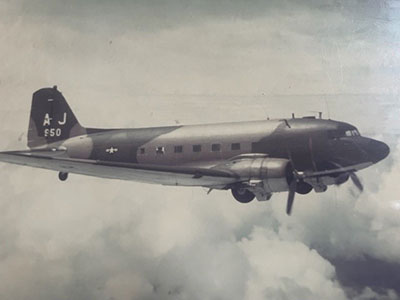
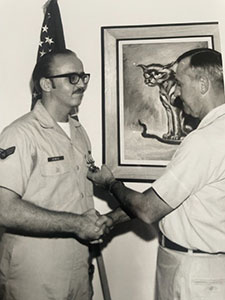
Rich explains that before he enlisted, he took a battery of tests. Based on the test results, the Air Force decided to send him to language school to learn North Vietnamese. “First, I had to wait to get clearance,” he says. “I needed top-secret crypto clearance and that was a problem because they couldn’t find papers on my mother coming into the states. That held up my clearance for a couple of weeks.”
Once the paperwork got straightened out, Rich’s knack for languages gave him a keen appreciation for the nuances between North and South Vietnamese dialects during the 36 weeks of instruction that followed. “There’s a big difference between the two languages,” he says. “When the North Vietnamese speak, they are distinct and talk with precision. South Vietnamese are more guttural and have an accent. When we listened to them on the radio, you knew right away who was speaking.”
His next stop was Goodfellow Air Force Base in San Angelo, Texas for radio training. Once his radio training was complete, he went to Fairchild Air Force Base in Spokane, Washington for three weeks of survival school. He then went to Hamilton Air Force Base in Novato, California, for M16 training. Now a highly trained airman, Rich boarded a plane for Clark Air Force Base in the Philippines.
“When we completed our training in San Angelo, the assignments came out. There were 13 guys in my class; 12 were going to Okinawa, one was going to Vietnam. I was supposed to go to Okinawa. The guy who was supposed to go to Vietnam was married and had kids. So, I talked to the sergeant and swapped spots with him.”
At Clark AFB, he took jungle survival training, learned how to perform evacuations from helicopters and how to escape and evade enemy combatants.
“We were sent out in the jungle and had to evade the local people all night. We carried two sets of dog tags: one was red, which meant you were injured; the other was silver. If you got caught, you would give a silver dog tag to the local who would take you back to the instructors and they would pay the finder an incentive for capturing us. To evade capture, I found the biggest, ugliest thorn bush I could find, crawled in and stayed there all night! I wasn’t going to get caught!”
Finally, Rich was sent to Tan Son Nhut Air Base, near Saigon in Southern Vietnam where he put his newly minted skills to work. His first night there, he arrived late at night, found an empty bunk and sirens started going off. “I woke a guy near me and said ‘Sorry, I just got here, what are the sirens all about?’ He said ‘There’s a rocket attack and you’ve got two choices. Out behind the barracks there is a bunker. You can hide there, but it’s filled with rats. Or you can go up on your bunk and get some sleep.’ I asked him how long the attacks usually take. ‘It doesn’t matter. If the rocket hits the barracks, you have nothing to worry about!’ So I crawled to the upper bunk and went to sleep.”
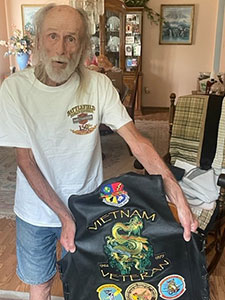
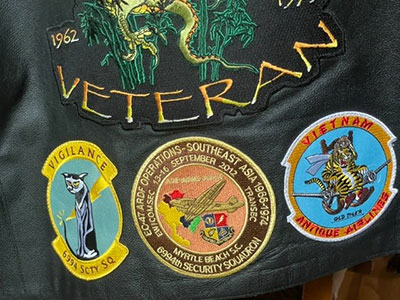
At Tan Son Nhut, Rich was assigned to the 6994th Security Squadron, which flew in unarmed WWII vintage EC-47 aircraft. The 6994th was responsible for locating and identifying the enemy using airborne radio direction finding (ARDF) techniques and collecting intelligence to support ground combat commanders. According to the squadron’s website, 6994th.com, up to 95% of the B-52 attacks in Vietnam were based, in part, on information collected by the squadron.
Rich’s job was to listen for precise code. “Messages by the North Vietnamese were either four- or five-digit numbers. If they were speaking Vietnamese by itself, it was probably useless. But if they were transmitting in numbers then you paid attention. I was transcribing what was being sent. The guy next to me would lock on to the transmission to get a ‘fix’ and pass that to the navigator. Then we’d change course, trying not to lose the signal. We’d take three fixes to establish an area, then call that information down to the ground and they’d bring the F-4s or whatever and blow the area. It was spying, in a nutshell.”
Rich reports that all 354 missions were different, some more hectic than others and some just plain boring. “Every day you went up in that stupid aircraft that was built before WWII. You didn’t know if you were coming back or not. Some days we flew in places that there was no way they were going to acknowledge we were flying in – Cambodia, Laos. We couldn’t say that we were there, but I’ve got some great pictures to prove it!”
One of the highlights of his two and half years in-country was a perk for extending his tour for six months. By doing so, Rich and his good friend, Joe Martin, were given a 30-day leave and a free airplane ticket to anywhere they wanted to go. “We asked if it was possible to get an ‘open ticket’ and they said ‘sure!’” he laughed. Using this loophole, Rich and Joe enjoyed a trip around the world in 30 days starting in Saigon with stops in San Francisco, Raleigh, New York City, London, Copenhagen, Geneva, Frankfort, Beirut, Rangoon, Bangkok and back to Saigon. “It cost us nothing but food and lodging,” he says. “We tried extending again to get the same award, this time with different cities. We asked the guy in charge, and he said ‘no, you guys stuck it to us once and we’re not going to let you do it to us again!’”
In March 1972, Rich’s tour of duty was complete, and he was officially discharged at Travis Air Force Base near San Francisco. “We were informed that we should change into our civilian clothes because there were protestors outside the gate. I looked at the lieutenant and I said ‘excuse me sir, don’t you think they can tell we’re servicemen? What difference does it make?’ I wore my uniform and walked out. I didn’t care. I got on a plane and went back to O’Hare.”
Back in Chicago, Rich stayed home a couple of months to unwind then went back to work in the mailroom at Price Waterhouse. He landed another job at Continental Bank where he met his wife, Sharon, and married her in 1978. He worked at the bank for several years, then got a call to join the Cook County Sheriff’s office where he worked out of Rolling Meadows and stayed with the County until his retirement 15 years ago.
While working full-time, he finished his undergraduate degree from Loyola, completed law school and passed the bar, but never practiced. “I don’t remember why,” he laughs. “I guess I just wanted to prove that I could do it!”
Nowadays, in warmer months, Rich and Sharon enjoy their classic car collection and activities hosted by the Lemont Classic Car Club. In colder weather, his attention turns indoors to his collection of American Flyer Trains, including the original set his father gave him in 1951. And, in tribute to his unique band of brothers, Rich and Sharon make it a point to attend annual reunions of the 6994th Security Squadron.
Looking back on his service, Rich says he’d do it all again. “The service teaches you common sense. After my first year in Vietnam, I became the ranking guy and I used to teach new recruits to look at each day as a game. The object of the game is to go home.”
Welcome home, Rich! Enjoy your well-deserved day of honor on the 103rd flight of Honor Flight Chicago.


